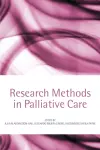
Research methods in palliative care
4 contributors - Paperback
£69.00
Professor Julia M Addington-Hall joined the School of Nursing and Midwifery, Southampton University as Professor in End of Life Care in 2004. She now heads the Cancer, Palliative and End of Life Care Research Group. Her current research programmes include palliative care beyond cancer (including stroke, heart failure and MND); depression at the end of life; the development and validation of an after-death questionnaire for bereaved people (VOICES), and evaluating health and social care services for people in the last months of life. She is co-Director of the new 'Cancer Experiences Collaborative' (CECo), funded by the UK National Cancer Research Institute. She is Chair of the UK Palliative Care Research Society. She is an editor of the journal 'Palliative Medicine', and a member of the editorial board of 'Journal of Pain and Symptom Control'. She has lectured extensively in the UK and abroad. Dr. Eduardo Bruera currently holds the F.T. McGraw Chair in the Treatment of Cancer and Chair of the Department of Palliative Care and Rehabilitation Medicine. He previously worked at the University of Alberta, helping to develop the Division of Palliative Care Medicine and the Edmonton Regional Palliative Care Program. Among his research interests are cancer pain, cachexia, fatigue, delirium, communication, and outcomes research in palliative care. He has a strong interest in the global development of palliative care and has collaborated for many years with the World Health Organization/Pan American Health Organization and served as Chair of the International Association of Hospice and Palliative Care (IAHPC) between 2000 and 2004. In addition to having published more than 700 papers, abstracts, and book chapters, Dr. Bruera has trained hundreds of physicians who are currently practicing palliative care around the world. Professor Irene Higginson is particularly known for her development of methods to assess the quality and outcomes of palliative care, evaluation of treatments and epidemiologically based assessment of problems and need in cancer and non-cancer. She has developed undergraduate and postgraduate education programmes for doctors, nurses and other professions, including a multi-professional Masters programme for the leaders in palliative care for the future. Irene Higginson has published widely on palliative care, quality of life measurement, and evaluation of services and therapies, in scientific journals and in textbooks. She has developed and validated two tools used widely in the UK and many other countries to help in the assessment of patients and families and in the quality of care, led the evidence review for the NICE guidance on Supportive and Palliative Care, and the WHO new guidance on Better Palliative Care for Older People. Professor Sheila Payne is a health psychologist with a background in nursing. She holds the Help the Hospices Chair in Hospice Studies based at the Institute of Health Research and works in collaboration with the International Observatory on End of Life Care at Lancaster University. Professor Payne has a long track record in palliative care research and scholarship. She previously led the Palliative and End-of-Life Care Research Group at the University of Sheffield. Her research agenda focuses on palliative and end-of-life care for older people and bereavement support. She holds a number of major grants in these areas and supervises PhD students. She co-directs the NCRI funded Cancer Experiences Collaborative with Professor Addington-Hall. Sheila has published widely in academic and professional journals, written ten books, and edits the 'Health Psychology' book series published by the Open University Press with Sandra Horn.